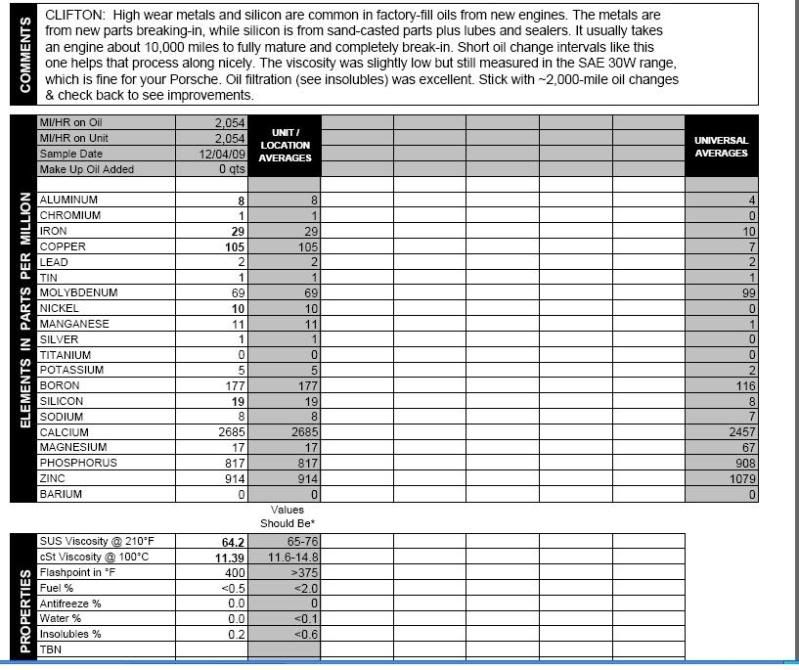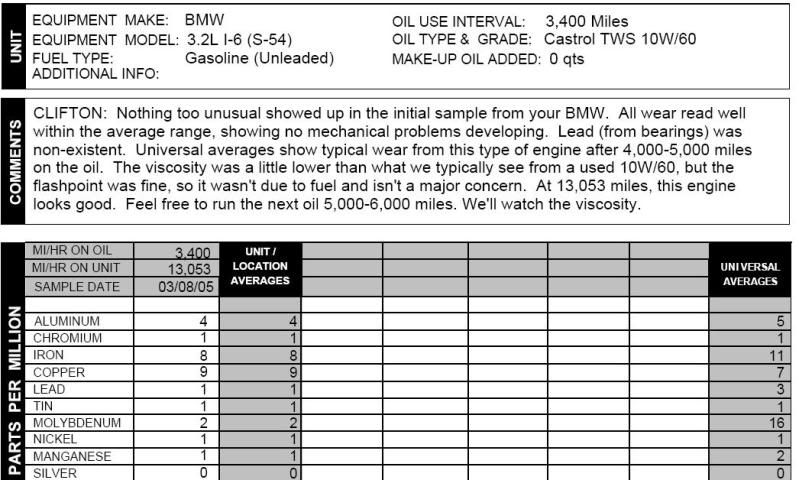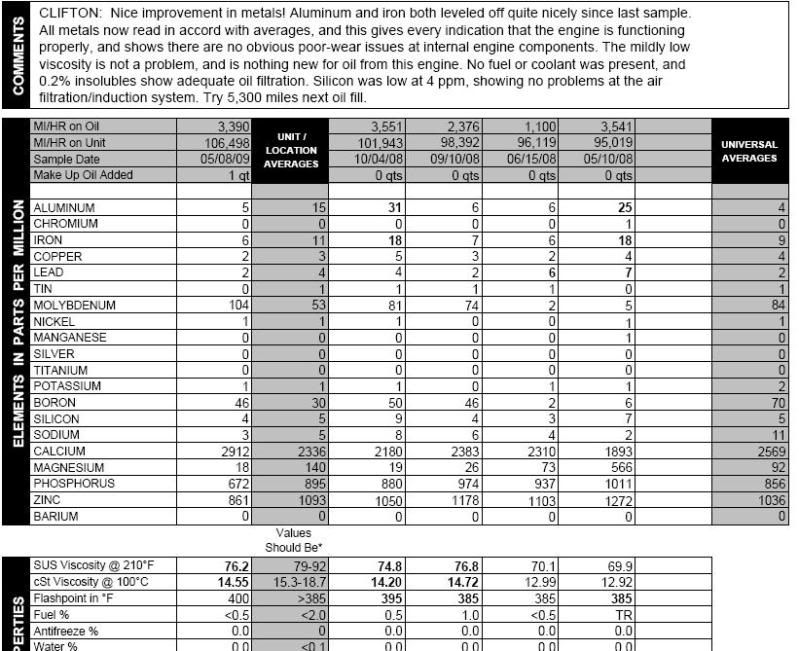End to the oil change after break-in debate
#1
Pro
Thread Starter
Based on many threads from this forum, there are countless debates on the topic of oil change frequency. Among those is the "to replace or not to replace" oil after the Porsche recommended 2,000 mile break-in period.
With many companies seeking to make low cost of ownership claims, it is hard to know who to believe when it comes to routine maintenance. Under normal conditions, synthetic oils have demonstrated that excessive oil changes (every 3K) are worthless. However, when it comes to break-in, it makes logical sense that metals will be higher as engine parts find their groove. As such, fresh oil after break-in seems ideal as it would remove unwanted debris.
Being the **** car owner that I am, I did a post break-in oil change. In addition, I decided to put some science behind the theory and sent the oil off for analysis.
Below is a Blackstone report on an oil sample taken from 2010 GT3 with 2,054 miles on it. I followed break-in by the book and performed an oil change shortly after crossing the 2,000 mile threshold. The results and feedback from the analysis were interesting and answered many questions for me.
Should a responsible/**** owner change their oil after break-in? You be the judge.

With many companies seeking to make low cost of ownership claims, it is hard to know who to believe when it comes to routine maintenance. Under normal conditions, synthetic oils have demonstrated that excessive oil changes (every 3K) are worthless. However, when it comes to break-in, it makes logical sense that metals will be higher as engine parts find their groove. As such, fresh oil after break-in seems ideal as it would remove unwanted debris.
Being the **** car owner that I am, I did a post break-in oil change. In addition, I decided to put some science behind the theory and sent the oil off for analysis.
Below is a Blackstone report on an oil sample taken from 2010 GT3 with 2,054 miles on it. I followed break-in by the book and performed an oil change shortly after crossing the 2,000 mile threshold. The results and feedback from the analysis were interesting and answered many questions for me.
Should a responsible/**** owner change their oil after break-in? You be the judge.

Last edited by Clifton; 12-19-2009 at 08:24 PM. Reason: corrected typos.
#5
Actually I think that the safest strategy is to change the oil with every fill up of the gas tank (assuming this is no less often than once a year).
After all it is cheap insurance and one can never be too safe (I wear belts and suspenders).
After all it is cheap insurance and one can never be too safe (I wear belts and suspenders).
#6
Still plays with cars.
Lifetime Rennlist
Member
boo - your posts are always SO helpful.
If the GT3 is tracked, the tranny fluid should be changed every ten hours of track time. At 200 MPH I guess that is 2,000 miles, but at a more reasonable average of 75MPH changes should be done at 1000 miles or less. When I change mine at those intervals the fluid comes out very dark.
Best,
If the GT3 is tracked, the tranny fluid should be changed every ten hours of track time. At 200 MPH I guess that is 2,000 miles, but at a more reasonable average of 75MPH changes should be done at 1000 miles or less. When I change mine at those intervals the fluid comes out very dark.
Best,
#7
Appreciate you sharing, but it's not surprising that you have elevated ppms of certain metals in the oil of a new engine. The reason this doesn't end the debate is that you would need to show that the amounts in excess of universal averages are harmful in some way.
Also, not to be a skeptical ***, but wouldn't changes at 2000 mile intervals for followed by testing by this company generate revenue for the testing company?
Finally, the word is "****."
Also, not to be a skeptical ***, but wouldn't changes at 2000 mile intervals for followed by testing by this company generate revenue for the testing company?
Finally, the word is "****."

Trending Topics
#8
Rennlist Member
No conclusion can be drawn from the data offered other than a company that analyzes oil recommends frequent oil changes and analysis.
What would be meaningful is to know what the levels of metal and silicon might be in oil taken from an engine with 20,000 miles on it.
Color me a skeptic (***), too, but I think the levels would be quite similar to the 2000-mile oil.
What would be meaningful is to know what the levels of metal and silicon might be in oil taken from an engine with 20,000 miles on it.
Color me a skeptic (***), too, but I think the levels would be quite similar to the 2000-mile oil.
#10
boo - your posts are always SO helpful.
If the GT3 is tracked, the tranny fluid should be changed every ten hours of track time. At 200 MPH I guess that is 2,000 miles, but at a more reasonable average of 75MPH changes should be done at 1000 miles or less. When I change mine at those intervals the fluid comes out very dark.
Best,
If the GT3 is tracked, the tranny fluid should be changed every ten hours of track time. At 200 MPH I guess that is 2,000 miles, but at a more reasonable average of 75MPH changes should be done at 1000 miles or less. When I change mine at those intervals the fluid comes out very dark.
Best,
Nobody is tracking it. Nobody is doing 200 mph with a new vehicle.
SO, if I understand you correctly, you are advocating 2000 mile oil changes for the first 10,000 miles as the original post suggests? So a mere 5 oil changes in the first 10,000 miles? Right?
#11
Pro
Thread Starter

Below is oil history on my M3 track car where I tested different oils and lengths of time on the oil. You can see times where tracking a car and running the oil too long hurts. Increase the frequency or trail off on the tracking, and things get better.

Last edited by Clifton; 12-19-2009 at 09:20 PM.
#13
But where is some kind of data that shows deviations from universal averages mean a significant impact on engine wear, performance, etc.?
(Dan beat me to it. This is like where a product contains some trace amounts of carcinogens and people assume it is dangerous.)
(Dan beat me to it. This is like where a product contains some trace amounts of carcinogens and people assume it is dangerous.)
#14
Nordschleife Master
#15
Pro
Thread Starter
Anything over the universal average, in excess, can be considered harmful and a point of concern. Example, M3 S-54 motors had issues in 2001-2003 with rod bearing failures. High traces of lead & nickle (above the universal average) would provide the early warning of any pending failure.
Actually no, once the ppm levels begin to drop/level out, Blackstone will actually recommend new higher mileage check points; if you wish to follow them.



